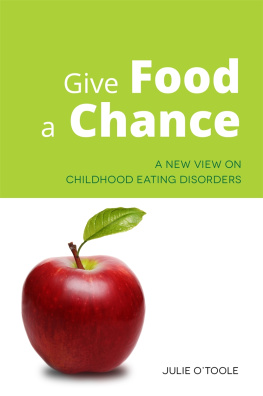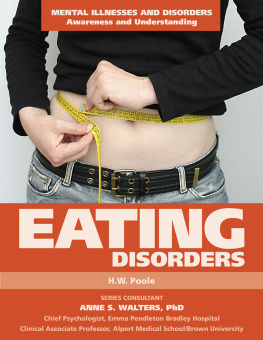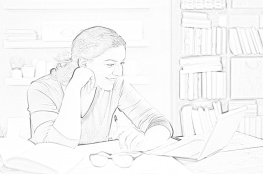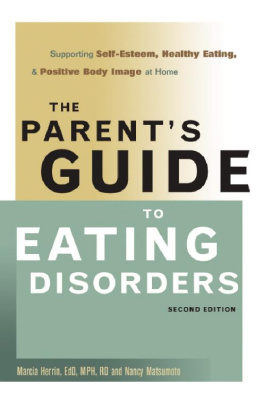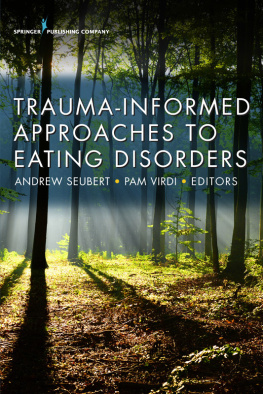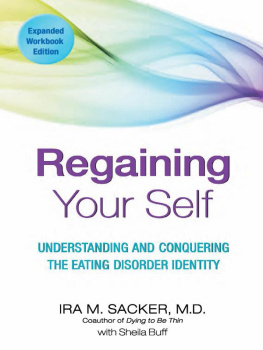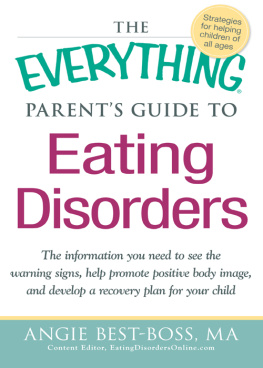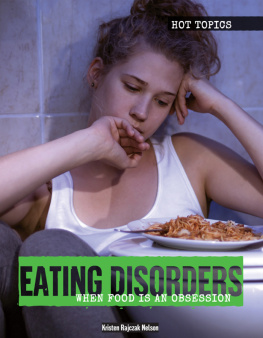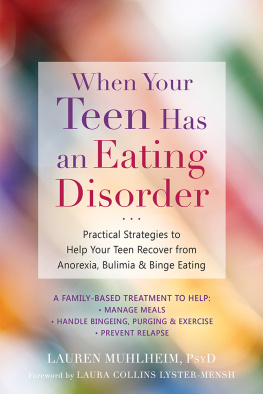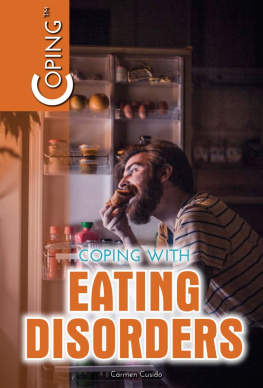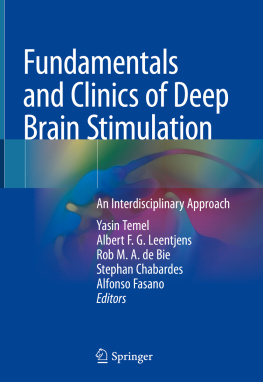
Give Food a Chance
of related interest
A Parents Guide to Defeating Eating Disorders
Spotting the Stealth Bomber and Other Symbolic Approaches
Ahmed Boachie and Karin Jasper
Foreword by Dr. Debra Katzman
ISBN 978 1 84905 196 5
eISBN 978 0 85700 528 1
Can I tell you about Eating Disorders?
A guide for friends, family and professionals
Bryan Lask and Lucy Watson
Illustrated by Fiona Field
ISBN 978 1 84905 421 8
eISBN 978 0 85700 797 1
Part of the Can I tell you about? series
Ed says U said
Eating Disorder Translator
June Alexander and Cate Sangster
Foreword by Laura Collins
ISBN 978 1 84905 331 0
eISBN 978 0 85700 677 6
Maintaining Recovery from Eating Disorders
Avoiding Relapse and Recovering Life
Naomi Feigenbaum
Foreword by Rebekah Bardwell Doweyko
ISBN 978 1 84905 815 5
eISBN 978 0 85700 250 1
Give Food
a Chance
A New View On Childhood Eating Disorders
JULIE OTOOLE

Jessica Kingsley Publishers
London and Philadelphia
First published in 2010 by Perfectly Scientific Press
This edition published in 2015
by Jessica Kingsley Publishers
73 Collier Street
London N1 9BE, UK
and
400 Market Street, Suite 400
Philadelphia, PA 19106, USA
www.jkp.com
Copyright Julie OToole 2010 and 2015
Front cover image source: Shutterstock.
All rights reserved. No part of this publication may be reproduced in any material form (including photocopying or storing it in any medium by electronic means and whether or not transiently or incidentally to some other use of this publication) without the written permission of the copyright owner except in accordance with the provisions of the Copyright, Designs and Patents Act 1988 or under the terms of a licence issued by the Copyright Licensing Agency Ltd, Saffron House, 610 Kirby Street, London EC1N 8TS. Applications for the copyright owners written permission to reproduce any part of this publication should be addressed to the publisher.
Warning: The doing of an unauthorised act in relation to a copyright work may result in both a civil claim for damages and criminal prosecution.
Library of Congress Cataloging in Publication Data
OToole, Julie (Pediatrician)
Give food a chance : a new view on childhood eating disorders / Julie OToole.
pages cm
Includes bibliographical references and index.
ISBN 978-1-84905-731-8 (alk. paper)
1. Eating disorders in children. 2. Eating disorders in children--Treatment. I. Title.
RJ506.E18O79 2015
618.928526--dc23
2014037879
British Library Cataloguing in Publication Data
A CIP catalogue record for this book is available from the British Library
ISBN 978 1 84905 731 8
eISBN 978 1 78450 099 3
O Andi, Molly
now beyond my voice and touch,
my intervention.
Has that siren tongue
whose lashings robbed you of your childhood
finally fallen silent?
Contents
Acknowledgments
There are a lot of people to be grateful to and for when writing a book that basically comprises a whole professional lifetime of work.
Lets start with the personal and most important: I am grateful for my father, Walt OToole, who modeled the passionate scientist and free-thinker, who believed in me and taught mea girl child in the 1950s and 60sthat I could be anything I wanted to be and say anything I wanted to say, however irreverent. And for my mother, Jane Ball OToole, who was the wind beneath both of our wings. Deepest thanks to my husband Steve Nemirow for naming the Kartini Clinic, for helping me understand that it could be done and for just plain making what I do important in our life together. Thanks to two of our children who have dedicated their own professional careers to children with eating disordersmy son, Morgan OToole-Smith, and oldest daughter, Sheila Scrobognaand to our daughters Ariel Winkleblack and Aurora Keeler, who had to endure things like whole milk and family dinners that none of their friends did. Gratitude to childhood friend and role model Ben Moll who never understood how his love of science and the natural world inspired me, first as a kid and later as a clinician.
Thanks that can no longer be expressed in person to Frieda Politzer, who taught me to be skeptical of medical practitioners, such as myself, and who suffered much at the hands of psychiatry of the 50s and 60s. A martyr to mother-blaming, she learned to send them all straight to the devil and go her own way. In many ways, because of her courageous example, I could challenge the paradigms of my day.
To the Bundesrepublik Deutschland (Germany) for the great privilege of studying medicine at their invitation and to Professor Johann Buchler (Chemie), Professor Henning Beier (Anatomie), and Professor Aach (Botanik) for giving a young single mother a job. And to those whose friendship there meant everything: Dr. Elke Dyck-von Fehrn, Dr. Inggriani Gandha, Yetty Limoerty-Kremer, and Renate Carrell.
And on the professional side I want to thank those who have worked with our kids all these years, feeding, teaching, loving, supporting, inventing, and supervising: Shanna Greene, Jade Buchanan, Jayotta Feimoefiafi, Janiece Desocio, Brittni von Ahlefeld, Leslie Weisner, Bart Walsh, Megan Lukatch, Amy Stauffer, Judith Potts, Jody Dutra, Kimber Khafoury, Kendra Carlton, and Sherrill Gandsey. And those colleagues from whom I have learned: Bryan Lask, Ken Nunn, the late Peter Beumont, Michael Kohn, Simon Clarke, Sloane Madden, and Iris Litt.
I give thanks particuarly for a dedicated, courageous, and energetic partner Dr. Naghmeh Moshtael and we both give thanks for our collaboration with Dr. Emily Cooper who has taught and continues to teach us about metabolism and weight balancing.
For her courageous, irreverent encouragement and feed-back I thank Laura Lyster-Mensch (Collins) and Jamie Lee Curtis Guest for love, friendship, and lightning-like intervention when needed.
A faraway thanks from an invisible disciple to M. Tottori, the originator of your patients are your teachers. In Honolulu to Dr. John Balfour and Debra Balfour RN. Thanks to the late Dr. V. (Emanuel Volgaropoulus) and the late Bob Worth for opening my eyes to epidemiology and public health.
To the nurses at LBJ Tropical Medical Center in Samoa and the gentle/fierce people they, and I, served.
Heartbroken thanks to the late Richard Crandall, scientific thinker extraordinaire, beloved friend, free-thinker, Apple scientist, and Reed College advanced computation professor, for giving this book a chance.
And the kids. I am always grateful for the kids.
Julie OToole
Kartini Clinic
Portland, Oregon
September, 2014
Preface
I initially wrote this book as a detailed guide for clinicians who care for children with eating disorders. It seemed to me at the time that a technical book written for doctors and nurse practitioners, one readable by an educated lay public, would best serve to spread the message of a new treatment paradigm. On reading it my son Morgan suggested that my audience was all wrong. Write for those who care the most, he told me, write for parents. Parents, he suggested, will care most passionately about the details, will be most motivated to spread the word. Speak to them and they will speak to the doctors. Speak to them and the children will best be served.
Introduction
1.1 Our patients are our teachers
In 1980 I graduated from medical school in Aachen, Germany as an American foreign student. We had classes in every imaginable subject, the German medical system being extraordinarily thorough: In legal medicine, in forensic medicine, in psychological medicine, and in the more usual areas as well: Pharmacology, neurology, pediatrics, surgery, and so on, covering diseases and conditions common and rare. But no one taught us about anorexia nervosa. We had a classmate who was aicted. Everyone knew itit was obvious: She was skeletally thin, the veins in her arms stood out like ropes, her lackluster hair clung thinly to her head, she rode around campus on her bike furiously, exercising, exercising, always exercising, and she was a fantastic student. But she was shunned socially, and the young male medical student she admired was appalled at the deranged appearance she found acceptable.
Next page
